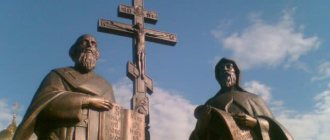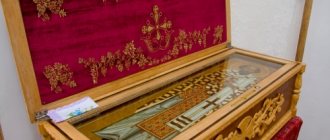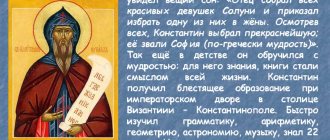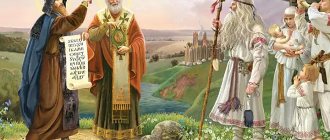Cyril (in the world Constantine , nicknamed the Philosopher ; 827-869) and Methodius (in the world Michael ; 815-885) are saints of the Orthodox and Catholic churches, brothers from the city of Thessaloniki (now Thessaloniki), creators of the Old Church Slavonic alphabet and Church Slavonic language, Christian missionaries.
There are many interesting facts in the biographies of Cyril and Methodius that will be mentioned in this article.
So, here are short biographies of the brothers Cyril and Methodius.
Biographies of Cyril and Methodius
The eldest of the two brothers was Methodius (before tonsure Michael), born in 815 in the Byzantine city of Thessalonica. 12 years later, in 827, Cyril was born (before Constantine was tonsured). The parents of future preachers had 5 more sons.
Childhood and youth
Cyril and Methodius came from a noble family and were raised in the family of a military leader named Leo. Biographers are still arguing about the ethnicity of this family. Some classify them as Slavs, others as Bulgarians, and still others as Greeks.
As children, Cyril and Methodius received an excellent education. It is worth noting that initially the brothers were not united by common interests. So, Methodius entered military service, and later took the position of governor of the Byzantine province, showing himself to be a skillful ruler.
From an early age, Kirill was distinguished by excessive curiosity. He spent all his free time reading books, which were of great value in those days.
The boy had outstanding memory and mental abilities. In addition, he spoke Greek, Slavic, Hebrew and Aramaic. After studying at Magnavra University, the 20-year-old young man was already teaching philosophy.
Brothers in Rome
The brothers Cyril and Methodius, whose biography is also revered by Catholics, arrived to Adrian II in 868. He came to a compromise with the Greeks and gave his consent to allow the Slavs to conduct worship in their native languages. The Moravians (ancestors of the Czechs) were baptized by bishops from Rome, so were technically under the jurisdiction of the Pope.
While still in Italy, Konstantin became very ill. When he realized that he would soon die, the Greek accepted the schema and received the monastic name Cyril, with which he became known in historiography and popular memory. While on his deathbed, he asked his brother not to give up his general educational work, but to continue his service among the Slavs.
Christian service
Even in his youth, Kirill had a wonderful opportunity to become a high-ranking official, and in the future, the commander-in-chief of the army. And yet, he abandoned a secular career, deciding to connect his life with theology.
In those years, the Byzantine authorities did everything possible to spread Orthodoxy. To do this, the government sent diplomats and missionaries to those regions where Islam or other religions were popular. As a result, Kirill began to participate in missionary activities, preaching Christian values to other peoples.
By that time, Methodius decided to leave political and military service, following his younger brother to the monastery. This led to him taking monastic vows at the age of 37.
In 860, Cyril was invited to the emperor’s palace, where he was assigned to join the Khazar mission. The fact is that representatives of the Khazar Kagan promised to accept Christianity on the condition that they were convinced of the authenticity of this faith.
At the upcoming debate, Christian missionaries were required to prove the truth of their religion to Muslims and ideas. Cyril took his older brother Methodius with him and went to the Khazars. According to some sources, Cyril managed to emerge victorious in a discussion with the Muslim imam, but despite this, the Kagan never changed his faith.
However, the Khazars did not prevent their fellow tribesmen who wanted to convert to Christianity from being baptized. During that period, an important event happened in the biographies of Cyril and Methodius.
While returning home, the brothers stopped in Crimea, where they were able to discover the relics of Clement, the holy Pope of Rome, which were then transported to Rome. Later, another significant event happened in the lives of the preachers.
One day, the prince of the Moravian lands (Slavic state) Rostislav turned to the government of Constantinople for help. He asked to send Christian theologians to him, who could explain Christian teachings to the people in a simple form.
Thus, Rostislav wanted to get rid of the influence of German bishops. This trip of Cyril and Methodius entered world history - the Slavic alphabet was created. In Moravia, the brothers did enormous educational work.
Cyril and Methodius translated Greek books, taught the Slavs to read and write and showed how to conduct divine services. Their train lasted for 3 years, during which they managed to achieve the most important results. Their educational activities prepared Bulgaria for baptism.
Cyril and Methodius meet with the Slavic people
In 867, the brothers were forced to go to Rome, accused of blasphemy. The Western Church called Cyril and Methodius heretics because they used the Slavic language to read sermons, which was then considered a sin.
In that era, any theological topics could only be discussed in Greek, Latin or Hebrew. On the way to Rome, Cyril and Methodius stopped in the Principality of Blaten. Here they managed to give sermons and also teach the local population the craft of books.
Arriving in Italy, the missionaries presented to the clergy the relics of Clement, which they had brought with them. The new Pope Adrian II was so pleased with the relics that he allowed services to be held in the Slavic language. An interesting fact is that during this meeting Methodius was awarded the rank of bishop.
In 869, Cyril died, as a result of which Methodius himself continued to engage in missionary activity. By that time he already had many followers. He decided to return to Moravia to continue the work he had started there.
Here Methodius had to face serious opposition from the German clergy. The throne of the deceased Rostislav was taken by his nephew Svyatopolk, who was loyal to the policies of the Germans. The latter did everything possible to hinder the monk's work.
Any attempts to conduct services in the Slavic language were persecuted. It is curious that Methodius was even imprisoned at the monastery for 3 years. Pope John VIII helped the Byzantine to freedom.
And yet, churches were still prohibited from holding services in the Slavic language, with the exception of sermons. It is worth noting that despite all the prohibitions, Methodius continued to secretly conduct services in Slavic.
Soon the archbishop baptized the Czech prince, for which he almost suffered severe punishment. However, Methodius managed not only to avoid punishment, but also to obtain permission to conduct services in the Slavic language. An interesting fact is that shortly before his death he managed to complete the translation of the Old Testament Scriptures.
Continuation of Methodius' preaching activities
Cyril and Methodius, whose brief biography is inseparable, became revered in Moravia during their lifetime. When the younger brother returned there, it became much easier for him to continue fulfilling his duty than 8 years ago. However, the situation in the country soon changed. The former prince Rostislav was defeated by Svyatopolk. The new ruler was guided by German patrons. This led to a change in the composition of the priests. The Germans again began to lobby for the idea of preaching in Latin. They even imprisoned Methodius in a monastery. When Pope John VIII found out about this, he forbade the Germans to conduct liturgies until they freed the preacher.
Cyril and Methodius had never encountered such resistance before. Biography, creation and everything connected with their life is full of dramatic events. In 874, Methodius was finally released and again became an archbishop. However, Rome has already revoked its permission to worship in the Moravian language. However, the preacher refused to bow to the changing course of the Catholic Church. He began to conduct secret sermons and rituals in the Slavic language.
Creation of the alphabet
Cyril and Methodius went down in history primarily as the creators of the Slavic alphabet. This happened at the turn of 862-863. It is worth noting that several years before this, the brothers had already made their first attempts to implement their idea.
At that moment in their biography, they lived on the slope of Mount Lesser Olympus in a local temple. Kirill is considered to be the author of the alphabet, but which one remains a mystery.
Experts are inclined towards the Glagolitic alphabet, as indicated by the 38 characters contained in it. If we talk about the Cyrillic alphabet, then it was obviously brought to life by Kliment of Ohrid. However, in any case, the student still applied Kirill’s work - it was he who isolated the sounds of the language, which is the most important factor in creating writing.
The basis for the alphabet was the Greek cryptography - the letters are very similar, as a result of which the Glagolitic alphabet was confused with eastern alphabets. But to designate characteristic Slavic sounds, Hebrew letters were used, including “sh”.
Translation of Christian books into Slavic language
In 862, ambassadors from the Moravian prince Rostislav arrived in Constantinople. They conveyed a message from their ruler to the emperor. Rostislav asked the Greeks to give him learned people who could teach the Slavs the Christian faith in their own language. The baptism of this tribe took place even before this, but every service was held in a foreign dialect, which was extremely inconvenient. The patriarch and the emperor discussed this request among themselves and decided to ask the Thessalonica brothers to go to Moravia.
Cyril, Methodius and their disciples began a great deal of work. The first language into which the main Christian books were translated was Bulgarian. The biography of Cyril and Methodius, a brief summary of which is in every Slavic history textbook, is known for the colossal work of the brothers on the Psalter, Apostle and Gospel.
Death
During a trip to Rome, Kirill was struck down by a serious illness, which turned out to be fatal for him. It is generally accepted that Cyril died on February 14, 869 at the age of 42. On this day, Catholics celebrate the feast day of saints.
Methodius survived his brother by 16 years, dying on April 4, 885 at the age of 70. After his death, liturgical translations were again banned in Moravia, and the followers of Cyril and Methodius began to be subjected to severe persecution. Today, Byzantine missionaries are revered in both the West and the East.
Experts in the Slavic language
The linguistic knowledge of noble Greeks can be explained by the history of Thessaloniki. In their era, this city was bilingual. There was a local dialect of the Slavic language here. The migration of this tribe reached its southern border, burying itself in the Aegean Sea.
At first, the Slavs were pagans and lived under a tribal system, just like their Germanic neighbors. However, those strangers who settled on the borders of the Byzantine Empire fell into the orbit of its cultural influence. Many of them formed colonies in the Balkans, becoming mercenaries of the ruler of Constantinople. Their presence was also strong in Thessaloniki, where Cyril and Methodius were from. The brothers' biography initially took different paths.
The beginning of the spiritual path
Court life did not suit Cyril, and he went to his brother’s monastery. But he never found the spiritual silence and solitude that he so longed for. Kirill was a frequent participant in disputes concerning issues of faith. He knew the canons of Christianity very well and often defeated his opponents thanks to his intelligence and high knowledge.
Later, the Byzantine emperor expressed a desire to win over the Khazars to the side of Christianity. Jews and Muslims have already begun to spread their religion on their territory. Cyril and Methodius were sent to enlighten the Khazar minds with Christian sermons. Their biography tells of an interesting incident. On the way home, the brothers visited the city of Korsun. There they were able to obtain the relics of St. Clement, the former Pope. After returning home, Cyril stayed in the capital, and Methodius went to the Polychrome monastery, which was located near Mount Olympus, where he received the abbess.








